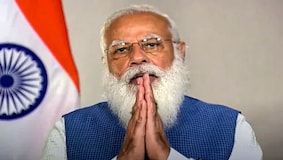Four lakh diarrhoeal disease deaths can be averted if Jal Jeevan Mission meets target, says WHO report
The study found that, on an estimate, if the Jal Jeevan Mission provided safely-managed drinking water to all of India, this would result in averting almost 4 lakh deaths caused by diarrhoeal disease.

Jal Jeevan Mission
According to a new World Health Organisation study, nearly 4 lakh diarrhoeal disease fatalities could be avoided if the Jal Jeevan Mission accomplishes its goal of delivering clean water to all rural households.
The government began the Jal Jeevan Mission (JJM) in 2019, a state-wide campaign that aims to deliver clean and adequate drinking water to all rural households through individual tap connections by next year.
The World Health Organization (WHO) was requested by the Ministry of Drinking Water and Sanitation to conduct a study to assess potential health gains and associated cost savings due to increased access to safely-managed drinking water services in India.
Related Articles
The study found that, on an estimate, if the Jal Jeevan Mission provided safely-managed drinking water to all of India, this would result in averting almost 4 lakh deaths caused by diarrhoeal disease.
According to official figures, till now 62 per cent of rural households have been provided with tap water connection.
“With universal coverage of safely-managed drinking water in India, almost 14 million DALYs (Disability-adjusted life years) from the diarrhoeal disease are estimated to be averted, resulting in estimated cost savings of up to USD 101 billion,” the study said.
Also, the study said that providing a tap connection to every household would save significant time on water collection (66.6 million hours each day), especially among women.
Presenting the research findings, Richard Johnston, co-lead of WHO/UNICEF Joint Monitoring Programme for Water Supply, Sanitation and Hygiene, said if the world achieves its Sustainable Development Goals (SDG) targets of drinking water and sanitation, it will be because of India.
“There are two reasons for it — population and size — as India is the country with the largest population in the world so what happens in India is important for the world but it is also because India is demonstrating what can be done and what is possible when it makes commitments and investments,” he said.
Dr Rajiv Bahl, Director General of the Indian Council of Medical Research, said these findings are plausible.
“We must understand that these are gross underestimates of the total benefits of providing safe water not only because these benefits go beyond health and affect many communicable and non-communicable diseases. And even malnutrition, which is a big issue for us as they are all related to water, so we must consider these just modest assumptions and tip of the iceberg,” Bahl said.
WHO estimation of health impacts is based on comparative risk assessment (CRA) methods, which are used extensively in the burden of disease assessments (Ezzati 2002, Pruss-Ustun 2019).
The analysis estimated potential health gains from the Mission by comparing two scenarios.
The JJM scenario assumed that coverage of safely managed drinking water services in India increases linearly from baseline levels to 100 per cent coverage at the end of the programme, whereas, the business-as-usual scenario assumed improvements in coverage rates are in line with historical annual rates of 0.5 percentage points change per year.
For the economic analysis, the value per DALY averted from the JJM initiative was based on an approach described in the 2001 report of the WHO’s Commission on Macroeconomics and Health which assigned each life year a value of three times the GDP per capita.
The Har Ghar Jal programme, implemented by the Jal Jeevan Mission under the Ministry of Jal Shakti, was announced by Prime Minister Narendra Modi on August 15, 2019. The program aims to provide every rural household with affordable and regular access to an adequate supply of safe drinking water through taps. The program’s components align with the WHO/UNICEF joint monitoring programme for water supply, sanitation and hygiene to monitor progress on SDG 6.1 for safely managed drinking water services
With inputs from agencies
Read all the Latest News, Trending News, Cricket News, Bollywood News,
India News and Entertainment News here. Follow us on Facebook, Twitter and Instagram.
also read

Centre urges North Eastern state to finish Jal Jeevan Mission by March 2024
The Union Minister of State for Jal Shakti, Bishweswar Tudu reviewed the implementation of JJM and other flagship programmes of the ministry. He said that works will progress if the state governments are taking interest in the mission

Narendra Modi lays foundation stone of rural drinking water projects in UP's Sonbhadra and Mirzapur
The total estimated cost of the projects is Rs 5,555.38 crore. The projects are planned to be completed in 24 months under the 'Jal Jeevan Mission' announced by the prime minister last year

Additional six crore rural households got tap water connections since Jal Jeevan Mission launch, says Centre
Minister of State for Jal Shakti Prahlad Patel said water conservation is a priority for the government to ensure that the future generation does not suffer


